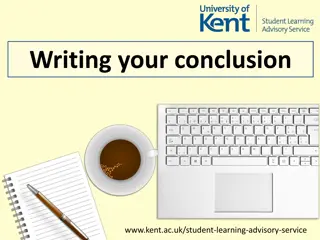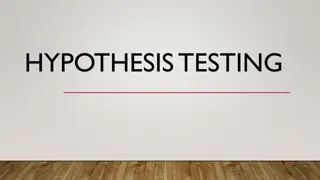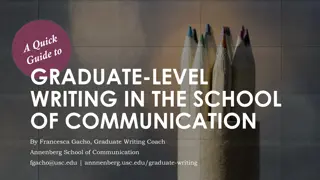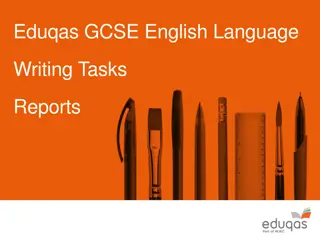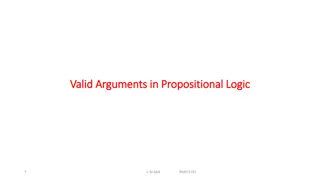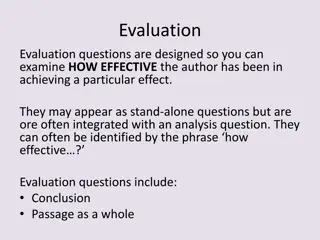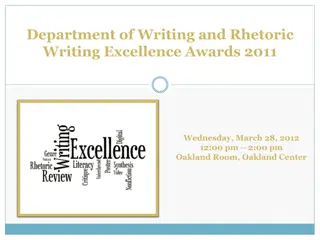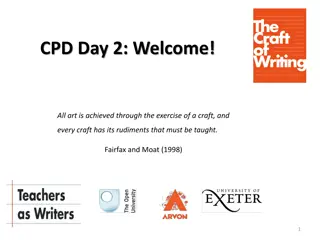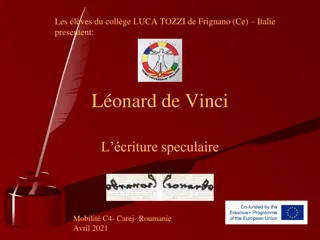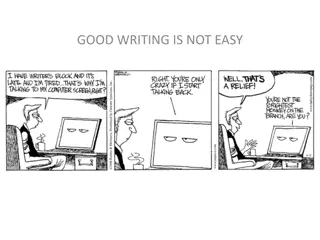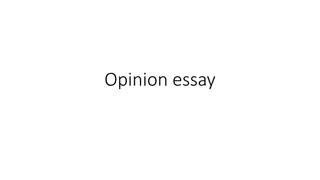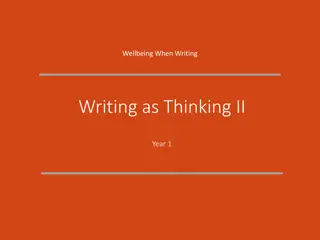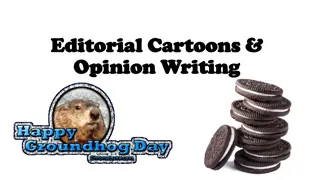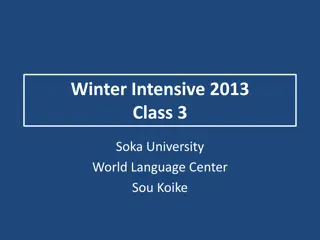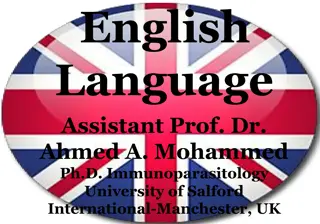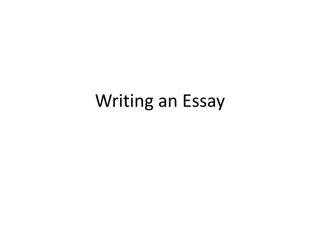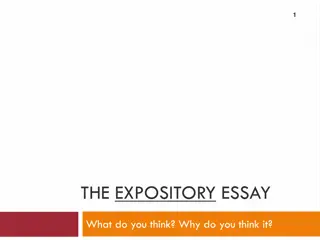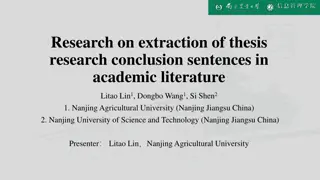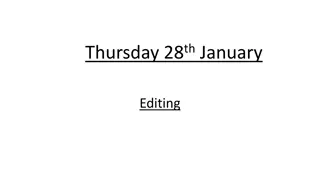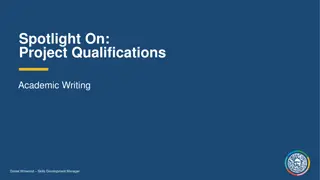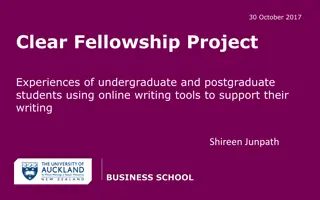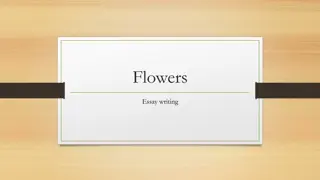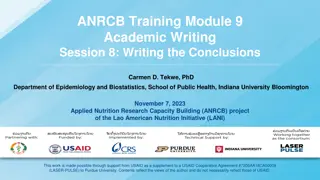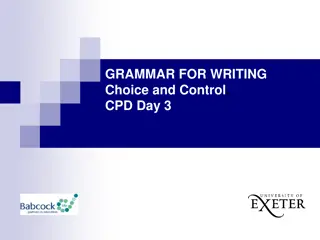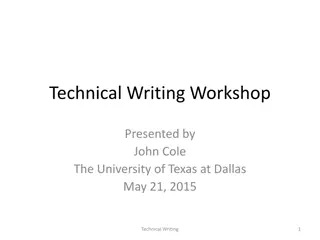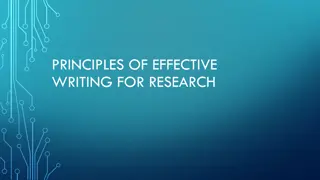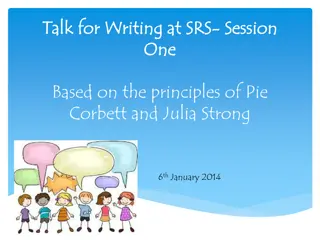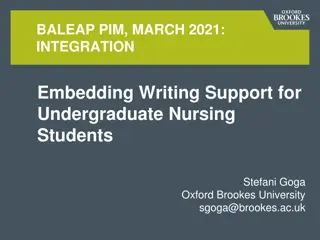Exploring Citizen Journalism and Non-Fiction Writing
Explore the world of citizen journalism and non-fiction writing, learning about text types, adapting writing to conventions, considering audience, purpose, and tone. Discover the significance and usefulness of non-fiction writing, and delve into creating various text types. Uncover the role of citiz
1 views • 11 slides
Comprehensive Overview of English Writing Course
This comprehensive English writing course, led by lecturer Muhammad Muslim Nasution, covers various aspects such as grammar, vocabulary, writing styles, and assessments. Students are required to actively participate, submit assignments, attend classes regularly, and produce writing projects. The cou
2 views • 8 slides
Structuring Your Essay Conclusion Effectively
Understand the importance of essay conclusions, learn how to structure a conclusion, identify key elements of a good conclusion, reiterate the question, summarize main points, present conclusions or hypotheses, and ensure the question is answered with supporting evidence.
0 views • 12 slides
Understanding Type I and Type II Errors in Hypothesis Testing
In statistics, Type I error is a false positive conclusion, while Type II error is a false negative conclusion. Type I error occurs when the null hypothesis is incorrectly rejected, leading to a conclusion that results are statistically significant when they are not. On the other hand, Type II error
0 views • 6 slides
Mastering Academic Writing: Strategies for Success
Academic writing is a formal style of writing with specific characteristics such as accuracy, brevity, and clarity. Understanding academic style is crucial for success in your course as it reflects your engagement with the content. Successful academic writers read, learn new vocabulary, and have a s
0 views • 23 slides
Challenges and Perspectives in Academic Writing for English Learners: Insights from Yemeni Students and Educators
Exploring the challenges and experiences of MA English students in academic writing, the narrative reveals issues faced by learners in Yemen such as outdated curricula, lack of teaching aids, and struggles with writing skills. Insights from a teacher highlight improvements in syllabi yet continued c
0 views • 14 slides
Academic Writing Essentials: Background, Types, and Formats
Explore the essential aspects of academic writing in this comprehensive guide. Learn about the purpose of academic writing, common types such as projects and essays, and the formats for short and long writing tasks. Discover the features of academic writing like accuracy, objectivity, and formal sty
4 views • 46 slides
Understanding Graduate-Level Writing in Academic Communication
Explore the nuances of academic writing at the graduate level in the School of Communication with Francesca Gacho, a Graduate Writing Coach. Learn about the features, characteristics, and strategies necessary for various genres of writing in this context. Discover the expectations and conventions of
2 views • 30 slides
Effective Tips for Successful Report Writing
Explore the key aspects of report writing including audience considerations, purpose, planning content, format, and essential features like clear layout, introduction, subheadings, and conclusion. Learn how to structure your report effectively and maintain a formal tone to achieve writing success.
0 views • 21 slides
Understanding Conditionals and Biconditionals in Logic
Conditional statements, also known as if-then statements, play a crucial role in logic. They consist of a hypothesis (following "if") and a conclusion (following "then"). By identifying the hypothesis and conclusion, writing conditional statements, evaluating truth values, and exploring converses, o
0 views • 19 slides
Understanding Valid Arguments in Propositional Logic
An argument in propositional logic consists of premises leading to a conclusion. Valid arguments are those where the truth of the premises implies the truth of the conclusion. To determine validity, you can construct a truth table to check if the conclusion always holds when all premises are true. T
0 views • 9 slides
Analysis of Evaluation and Conclusion Questions in Textual Analysis
Evaluation and Conclusion questions play a crucial role in assessing the effectiveness of an author in achieving specific effects and summarizing key points in a passage. These types of questions are commonly found in textual analysis tasks to evaluate the success of conveying ideas and themes. Eval
0 views • 9 slides
Creative Teaching Approaches for Persuasive Writing Workshop
The workshop focuses on using Grammar for Writing principles to enhance teaching of persuasive writing, emphasizing modal verbs and adverbials. It encourages creative writing by engaging young writers' imaginations and beliefs, allowing freedom to explore ideas. Participants learn key teaching princ
0 views • 51 slides
Department of Writing and Rhetoric Writing Excellence Awards 2011
The Department of Writing and Rhetoric at Oakland University organized the Writing Excellence Awards in 2011, recognizing outstanding submissions across various categories including writing from/about sources, original research, visual and/or auditory composition, fiction, and creative nonfiction. T
1 views • 42 slides
Comprehensive Guide to Kindergarten Writing Training for NYSESLAT 2019
Explore a detailed guide on Kindergarten Writing Training for the NYSESLAT 2019 exam. The training covers four constructed-response types including Letter Writing, Word Writing, Sentence Writing, and Writing a Story. Gain insights into the application of holistic writing rubrics, analyzing student r
0 views • 24 slides
Craft of Writing Framework for Teaching Writing
Explore the Craft of Writing Framework to enhance your teaching of writing skills, transforming your Arvon residential experiences into effective classroom strategies. Embrace language choices, text-level decisions, authorship, writing processes, and reader-writer relationships to empower students i
0 views • 39 slides
Enhancing Postgraduate Academic Writing: Feedback Collaboration Model
Developing a collaborative model for postgraduate academic writing courses involves understanding the role of feedback, focusing on content feedback, and exploring the intersections between discipline specialist and writing tutor feedback to improve academic writing abilities. Feedback offers valuab
1 views • 27 slides
Leonardo da Vinci and His Mirror Writing
The students of Luca Tozzi College in Frignano, Italy, explore Leonardo da Vinci's specular writing, a unique form of left-handed writing that can only be deciphered using a mirror. Discover Leonardo's diverse talents as a painter, inventor, scientist, and writer, with a mysterious side to him as a
0 views • 14 slides
Mastering the Art of Good Writing
Crafting compelling writing requires attention to detail, from intriguing leads to precise word choices and smooth transitions. Explore the essential elements of good writing, including tips for engaging readers and a checklist for evaluating writing quality. Learn about different types of leads in
0 views • 42 slides
Mastering the Art of Writing Opinion Essays
An opinion essay is a literary piece where the author expresses their stance on a topic with concrete arguments, supported by examples and reasoning. It typically consists of an introduction, three body paragraphs for arguments, and a conclusion. The introduction sets the stage, stating the topic an
0 views • 11 slides
Enhancing Wellbeing Through Writing: Writing as Thinking
Explore the connection between writing and thinking as a vital tool for academic writing. Delve into strategies for effective writing, evaluating its impact on rigorous thinking, and overcoming challenges through reflective writing exercises.
0 views • 34 slides
Exploring Editorial Cartoons and Opinion Writing
Editorial cartoons and opinion writing are powerful mediums used to express opinions on various topics. Editorial cartoons convey opinions through visual imagery and minimal text, while opinion writing presents the author's stance on timely issues. When crafting an opinion piece, it is essential to
0 views • 7 slides
Enhancing Writing Skills at Escrick C of E Primary School
At Escrick C of E Primary School, the approach to English education focuses on core skills like phonics, reading, writing, and letter formation. The curriculum incorporates a variety of text types and genres, including persuasive writing, biographies, fiction, and poetry. Writing activities are embe
0 views • 10 slides
Effective Conclusion Writing Strategies in Winter Intensive 2013 Class 3
Enhance your conclusion writing skills by mastering the art of restating positions, avoiding common pitfalls, and providing strong reasoning. Explore real-life examples and best practices from Winter Intensive 2013 Class 3 at Soka University World Language Center.
0 views • 15 slides
Writing Tips for Effective Communication
Learn the rules of structuring paragraphs and texts, including focusing on one main point per paragraph, using connecting words for coherence, and following a writing process. Enhance your writing by organizing ideas, varying sentence and paragraph lengths, and engaging readers with a clear structur
0 views • 17 slides
Writing in Computer Science Research: Enhancing Technical Writing Skills
This course overview covers the main objectives, class structure, and learning outcomes of a Computer Science Research Writing course focused on developing students' writing abilities, providing constructive criticism, and applying technical writing concepts to research papers in a workshop format.
0 views • 46 slides
Understanding the Purpose and Power of Essay Writing
Exploring the origins of the word "essay," this content delves into the essence of essay writing as an act of weighing thoughts and ideas rather than providing a final conclusion. It discusses the goals behind writing essays, highlighting the significance of intention and different orientations that
0 views • 24 slides
The Power of Expository Writing: Importance and Impact
Expository writing is essential for clear communication and expressing thoughts effectively through written words. This form of writing helps convey ideas, information, and opinions concisely, making it crucial for academic, professional, and personal communication. The structure of expository writi
0 views • 30 slides
Automatic Extraction Model of Thesis Research Conclusion Sentences
Full-text academic literature contains rich data that can be analyzed using machine learning techniques. This research focuses on extracting thesis research conclusion sentences automatically to enhance summarization processes. The study involves data processing, annotation, and creating discriminan
0 views • 9 slides
Spring into Writing: Enhancing Writing Skills for Children
Join us for an evening dedicated to enhancing writing skills for children according to Maryland College and Career-Ready Standards. Learn about writing expectations, get motivated writing ideas for children, and explore fun writing opportunities at home. The event will provide insights into differen
1 views • 19 slides
Learning to Edit and Improve Writing Skills
Today's lesson focuses on editing and correcting mistakes in writing, emphasizing the importance of identifying errors in spelling, punctuation, and grammar. Students are encouraged to review their own work, make necessary edits, and enhance their writing by using synonyms and improving word choice.
0 views • 6 slides
Genre Approach to Academic Writing
Explore the genre approach to academic writing focusing on purpose, audience, and organization. Learn about different genres, key elements of writing, and the importance of analysis. Discover how to structure your introduction, body paragraphs, methods, results, conclusion, and discussion effectivel
0 views • 23 slides
Exploring the Impact of Online Writing Tools on Student Writing Experiences
This project by Shireen Junpath delves into the experiences of undergraduate and postgraduate students using online writing tools to enhance their writing skills. The study aims to understand the effectiveness of tools like Grammarly, Lextutor, and Academic Phrasebank from the perspectives of studen
0 views • 27 slides
Analyzing the Ending of 'Flowers' by Robin Jenkins
This essay guide provides a structured approach to analyzing the effective ending of the short story "Flowers" by Robin Jenkins. It includes steps such as reading the story, identifying what is effective about the conclusion, recognizing examples of imagery, and joining a class discussion on CommonL
0 views • 8 slides
Mastering Academic Writing Conclusions
Learn the essential steps to craft a compelling conclusion in academic writing, including restating the topic, summarizing results, addressing opposing views, stating significance, and offering recommendations. Understand the dos and don'ts to create a strong conclusion that leaves a lasting impress
0 views • 12 slides
Creative Teaching Approaches in Grammar and Writing Intervention
Re-iterating teaching principles for writing intervention, focusing on grammatical subject knowledge, adverbials, modal verbs, and passive voice. Emphasizing creative teaching methods for persuasive writing, fostering imagination, emotions, and personal beliefs in young writers. Incorporating space
0 views • 60 slides
Comprehensive Technical Writing Workshop by John Cole at The University of Texas at Dallas
Explore the world of technical writing with John Cole, an experienced instructor at The University of Texas at Dallas. This workshop covers the fundamentals of technical writing, including course objectives, programming, course outline, traits of technical writing, and what technical writing truly e
0 views • 58 slides
Writing Research Papers Effectively: Guidelines and Steps
Effective writing for research involves developing a good research idea, writing a literature review, and understanding the key elements of writing research articles. This process includes coming up with a strong research question, gathering relevant information, creating an outline, writing the dra
0 views • 26 slides
Enhancing Writing Skills Through Talk for Writing Approach
Discover the key principles of Talk for Writing, understand the importance of Shared Writing, and explore how to improve the teaching and learning of writing in your classroom. Learn about the challenges children face in writing compared to reading and how Talk for Writing can help externalize the i
0 views • 27 slides
Integrating Writing Support for Nursing Students: A Genre-Based Approach
Designing writing support for undergraduate nursing students involves understanding the cohort's unique needs, such as time constraints and diverse learning backgrounds. Using a genre-based approach, which focuses on analyzing specific student genres, can enhance instructional materials and improve
0 views • 17 slides


